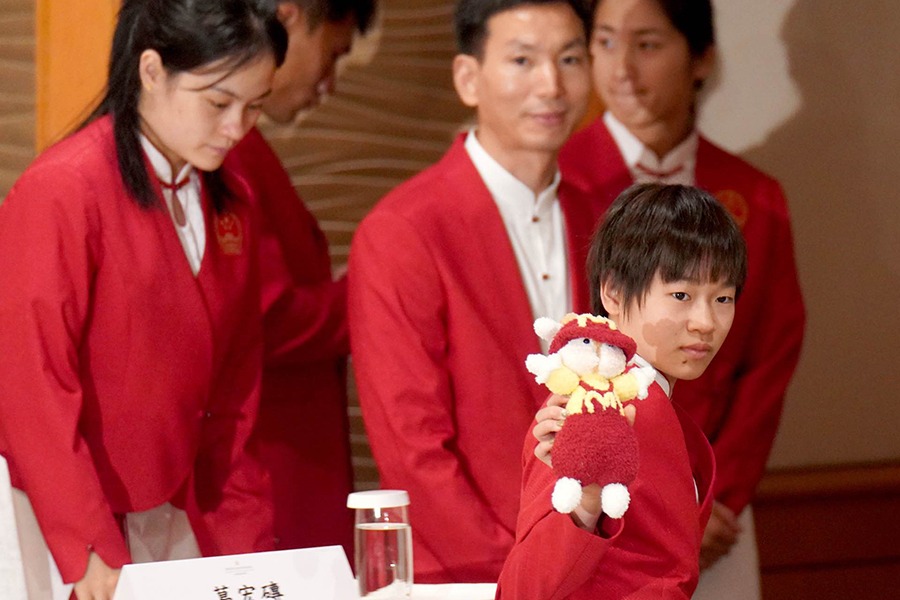Enjoying the grind
Teen skater relishes Olympic journey, despite last-gasp loss


From skating for fun at a square near her home, to riding to stardom in Paris, skateboarding prodigy Cui Chenxi has been an ambassador for her sport, giving skateboarding's rise in China a major boost with her Olympic breakthrough.
Always a fearless, sporty type since she was little, Cui sent an inspirational message to all her peers about the power of passion on Sunday, by riding her beloved skateboard — a pastime she picked just four years ago — all the way to a historic fourth-place finish in women's street final at the Olympic Games in Paris.
Despite narrowly missing out on a podium finish, Cui has enjoyed every bit of her Olympic journey, which came with crashes, slip-ups, scratches and broken teeth, before eventually landing her on the world's highest stage.
"A little bit, just that, no more," Cui, a 14-year-old middle school girl, said of her disappointing defeat at the hands of Brazil's Rayssa Leal at Paris' iconic Place de la Concorde.
"Overall, I feel satisfied with my performance today, and I enjoyed competing in the sport that I love so much all the way to the Olympics," said Cui, who, aged just 13, won the same discipline at last year's Asian Games, making her the country's youngest gold medalist at the continental event.
Boasting two clean executions out of five trick attempts, Cui held off a group of higher-profile opponents, all teenagers, to settle for fourth place with a total of 241.56 points in the street discipline final on Sunday. It marks a major step up in performance for Chinese athletes, with Cui finishing two spots better off than her senior teammate, Zeng Wenhui, at the sport's Olympic debut at Tokyo 2020.
Skateboarding powerhouse Japan still reigned supreme in the event, with world No 1 rider Coco Yoshizawa and No 2 Liz Akama enjoying a one-two finish on the podium after going neck-and-neck in their own Olympic debut.
Brazilian Leal, silver medalist in Tokyo three years ago, came back from behind to claim a bronze by stomping her second successful trick on her last attempt to leapfrog Cui, who had held third place before Leal's final attempt.
Skateboarding street at the Olympics is competed over two sections, where each skater takes two 45-second runs on a course featuring stairs, ledges, curbs and handrails in the first phase, before each performing five tricks in the second.
A skater's final score is aggregated from their best run and two most successful tricks, requiring a versatile repertoire imbued with quality, creativity and style to prevail.
Despite getting knocked off the podium, Cui remains upbeat, relishing how far the sport has taken her and the frenemy relationship she has with her teen rivals.
"I am just so happy to be here and to have fun with all the girls as more of a group of friends than opponents," said a jubilant Cui, who greeted spectators, exchanged a few pins and fist-bumped with journalists after the final.
"I executed my first two tricks the way I wanted, but failed to step up a gear when I needed a higher-difficulty move to beat the Brazilian girl's fifth trick.
"I can live with that, though, because I haven't quite yet grasped that difficult trick well enough in training.
"I kind of feel happy for her (Leal) because she's such a good skater who deserved the place on the podium, while I will definitely keep going, perfect my own tricks and get better next time."
Entering the Olympic race as a newcomer, Cui said she got along well with all the girls, Australia's Chloe Covell in particular, and apparently has won over some new fans. On her way to her post-final interview, a young boy approached her from the stands, asking for an autograph and, even more boldly, for her skateboard.
Cui waved to him, gently refused to give up her board, but took pride in knowing that she's made a good example and helped draw more attention to the sport.
"Of course I'd like to see more young people my age, or even younger, pick up a skateboard, but I want them do it only for fun, not to push too hard for results, or whatever," said Cui, who, at the age of 9, picked skateboarding from among many other sports, including soccer and table tennis, as her favorite.
"The pure joy of landing a hard trick, after trying and failing so many times, is so satisfying that I hope more young skaters can feel it and fall in love with it."
Thanks to the Olympic exposure, skateboarding is gaining traction across China, highlighted by the bustling scenes at Shanghai's dockland park, where parents and their kids joined long queues to sign up for entry-level junior courses during the sport's Olympic qualifier series earlier this year.
The trendy urban sport, which used to be among the least promoted sports activities due to its rebellious nature, has now grown in popularity with Chinese parents, with the soaring businesses of junior training clubs in major cities such as Beijing, Shanghai and Guangzhou, providing proof of the changing perception.
The governing body will, for sure, aim to capitalize on the trend, according to Wei Yong, secretary-general of the Chinese Roller Sports Association.
"Since last year, we've been developing a national reserve team and have organized a winter camp for all talented youngsters aged between 9 and 14 to be identified, promoted and developed at the same time," Wei told China Sports Daily.
"Kids learn and grow together, making future prospects for the 2028 Olympics quite bright," he said.
sunxiaochen@chinadaily.com.cn
Most Popular
- Mainland Olympians visit Hong Kong Sports Institute
- Stars align for 'unprecedented' turnout at China Open
- Hong Kong welcomes Olympic stars
- Cyclist Li claims China's 1st gold at Paris Paralympics
- Chinese Olympic champions arrive in Hong Kong for 3-day visit
- Chinese Olympic team arrive in Hong Kong






























